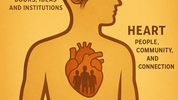So what's better, AI or humans? It all depends upon what we are measuring. In the combat field AI is dominant with the speed, logic and level of aggression. But what about wisdom and human compassion?
Wisdom is the quality of having experience, knowledge, and good judgment; the quality of being wise. For wisdom to exist there needs to be heartfelt compassion.
So where is the heartfelt compassion in the emerging technology of artificial intelligence?
Call centres around the world, full of human interaction and conversation are likely to be competing with the likes of 'Amelia' in coming months and years, as 'Amelia' is adopted by organisations in search for ever increasing efficiencies and catering for customers demand for quicker response times.
The Future?
This depends on the quality of the emergent algorithms (i.e, the implementation of a set of simple building block behaviours that when combined create more complex behaviours). But where is the compassion algorithm?
Compassion is important, because most of our brains are devoted to feelings, not logical and analytical thinking. And AI's don't have heart brains, (yes our hearts do have a brain, and so do our guts), so how are AI's going to compute heartfelt decisions?
Furthermore, how are AI's going to replicate accessing and assessing all what our body's intelligences inform us via Neuroception?
Why is Neuroception important?
Russ Henderson P.G.Dip (Psych), 2013Our autonomic nervous system (ANS) governs our subconscious responses to stimulus, ranging them from benign, friendly and hostile, allowing us to make immediate micro second decisions as to how to meet different kinds of our life experience." In other words, we don't just use our head brains, for our actions and decisions, we use our whole autonomic nervous system which networks our multiple brains, and this process is called Neuroception.
"
Hope is emerging, in the advertising sector, albeit its very early days and researchers are working on artificial compassion (AC).
Artificial compassion (Spencer Critchley, 2015) "systems will need to detect meaning across additional dimensions, taking in tone of voice, facial expression, and more. Research in this area is well under way, as in the University of Washington’s Automatic Tagging and Recognition of Stance (ATAROS) project, which studies such factors as “vowel space scaling and pitch/energy velocity."
So our future looks interesting and the big challenge will be how AI's replicate the neuroception process and have compassion.
References:
Air combat veterans proved to be no match for an artificial intelligence developed by Psibernetix. ALPHA has proven to be “the most aggressive, responsive, dynamic and credible AI seen to date.”
http://futurism.com/an-ai-just-defeated-human-fighter-pilots-in-an-air-combat-simulator/





